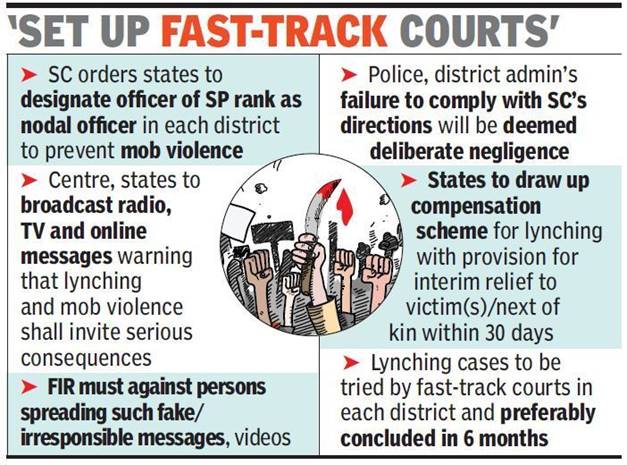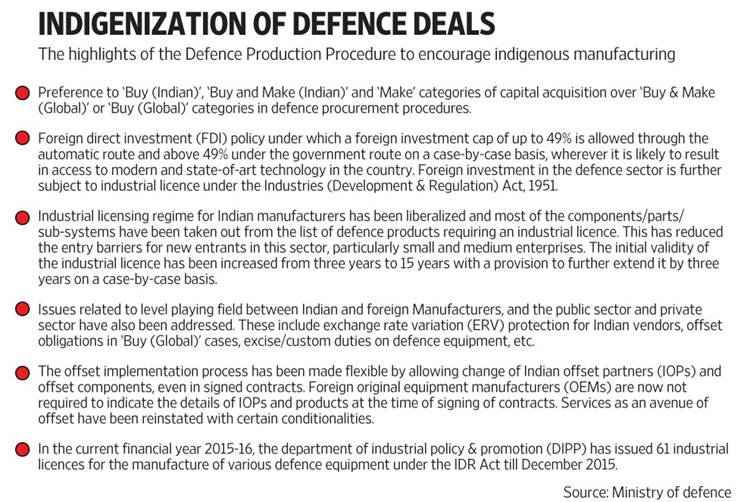



Govt acts tough: Accused in mob violence won’t get govt jobs in Bihar
With Bihar reporting 39 cases of mob violence in which 14 people were killed, the state government has decided to act tough to send a message across.
- An accused in a mob violence case might lose his job if he is a state government employee.
- If he is not a government employee, he gets automatically disqualified for any job in the government.
- Most of mob violence incidents were triggered by child-lifting rumours.
- Since almost 90 per cent mob violence cases in the past decade led to zero convictions, there is an urgency to gather more scientific evidence and name more accused.

- Cow protection vigilante undertaking lynching based on rumours or illegal smuggling of cows.
- Easy spread of rumours using social media: It transmitted rumours of children being kidnapped which caused lynching in Bengal, Assam.
- An apathetic or incapable administration and a mercurial population.
- Politically, the reaction to mob violence was either muted or in support of it. Opposition has been muted on the issue.
- There have been 88 people killed in lynching’s since 2015 across India.
- The reign of Gau Raksha gangs on highways in North and West India means a collapse of the vital cattle economy in these regions.
- Farmers who would earlier sell off their barren cows and unproductive bulls now find no buyers.
- Not only does the farmer suffer a loss of income from being unable to sell his cattle, these unsold animals are now often eating his crops.
- Urban areas are affected as well with reports of vehicle accidents being caused.
- In December, 2018, gau rakshaks shot dead a police officer in Bulandshar, Uttar Pradesh, even filming his dead body. It has led to shrinking of state.
Foreign Secretary said Prime Minister Narendra Modi, who is leaving for the US Friday, will not discuss the issue of Article 370 at the United Nations.
- Modi will visit the US from September 21 to September 27, during which he will meet Trump and address the UNGA session.
- Modi will host a special event “Leadership Matters: Relevance of Gandhi in the Contemporary World” on September 24.
- Other events lined up include a climate summit, a summit on strategic responses to terrorism and another on universal health coverage.
- Modi will be presented the 2019 Global Goalkeeper Award for his leadership of the Swachh Bharat Mission by Milinda and Gates Foundation.
- Article 370 is an “internal issue”.
- Prime Minister will focus on issues related to development and India’s role in shaping the global agenda.
- Terrorism is one of the issues, but will not be our focus.
- Pakistan has been trying to internationalise the ending of J&K’s special status under Article 370.
- Pakistan has a vested interest in preventing prosperity in Jammu and Kashmir, and in the Ladakh area of Kashmir, because a weak economy fuels separatist sentiments in some quarters. This fits into Pakistan’s larger strategy of using terrorism as a political tool.
- This is a country whose fingerprints are on terrorist strikes across the world and that was home to Osama bin Laden in his last days.
- Therefore, it also opposes the repeal of Article 370, which legitimized discrimination and hindered economic progress.
- The General Assembly is the main deliberative, policymaking and representative organ of the United Nations.
- Comprising all 193 Member States of the UN, it provides a unique forum for multilateral discussion of international issues including peace and security.
- Its powers are to oversee the budget of the UN, appoint the non-permanent members to the Security Council, appoint the Secretary-General of the United Nations, receive reports from other parts of the UN, and make recommendations in the form of General Assembly Resolutions.
At a time when the country is going through an economic downturn, Rajasthan Deputy Chief Minister said that instead of criticising the government one should give positive suggestions to reverse the slowdown.
- The first step is to accept reality and not live in denial.
- All surveys in India and across the world say that the economy is in bad condition.
- Pilot said investors’ confidence was down, NPAs had gone up, banks were not giving loans, jobs were not being created and factories have shut down.
A Group of Ministers (GoM), headed by Home Minister met to work out modalities for the sale of Air India which has a debt burden of over Rs 58,000 crore.
- In 2018-19, Air India incurred losses of around Rs 7,600 crore.
- By the end of 2018-19, it had a debt burden of around Rs 58,300 crore.
- The Modi government invited bids from investors in 2018 to buy out the government’s 76 per cent stake in Air India, along with the management control. However, the process failed as investors did not put in bids.
- Government retaining 24 per cent stake and corresponding rights.
- High debt.
- Volatile Crude Oil prices.
- Fluctuations in Exchange rate.
- Changes in Macro Environment.
- Restriction on bidding by individuals.
The Department of Investment and Public Asset Management has already prepared a fresh proposal for the Air India sale, incorporating issues like crude oil prices and exchange rate volatility. The government could this time around sell its entire 100 per cent stake in the Air India as it aims to conclude the sale process by December 2019.
Senior US and Chinese officials are meeting in Washington on in an attempt to settle their ongoing trade war, but a lasting peace seems elusive.
Since trade negotiations between the world’s largest economies broke down in May, both countries have added tariffs on billions of dollars of the others’ goods, broken good faith promises, and traded public insults.
The trade war has hardened into a political and ideological battle that runs far deeper than tariffs and could take years to resolve. Washington accused Beijing of reneging on commitments to change its laws to enact economic reforms, while Beijing called US President Donald Trump’s tariff’s “barbaric.”
Here is what is at stake:
- The Trump administration has rolled out stiff tariffs on Chinese imports since 2018. Chinese officials want these wiped out before they agree to any broader deal.
- The US has put 25% tariffs on some $250 billion of Chinese products, and China has retaliated with tariffs on $110 billion of US imports.
- Both sides made some concessions ahead of this week’s talks by suspending some planned tariffs, in a sign of goodwill.
- Beijing is smarting from Trump’s decision to blacklist Huawei, the world’s largest telecommunications equipment maker, which effectively banned US firms from doing business with the company.
- It has prompted many non US-based companies to cut their own ties to the firm.
- China wants the United States to lift those restrictions, but Washington is lobbying other countries to reduce dealings with Huawei.
- Legislation in the US Congress would prevent Chinese rail company CRRC and drone-maker DJI from bidding on US contracts that involve federal money.
- China has indicated it may strike back through limiting rare earth supplies to the United States.
- It could also revoke orders for airplanes built by Boeing Co, the No. 1 US exporter.
- Trump has called on US companies like General Motors Co to pull manufacturing facilities out of China.
- US companies complain they are pressured to hand over their competitive secrets as a condition for doing business in China.
- US officials also cited progress on cyber theft, services, currency, agriculture and non-tariff barriers to trade.
- China’s Communist Party is not willing to negotiate on the fundamental way that it manages the country’s economy, including support for state-owned enterprises and subsidies.
- One of the biggest US complaints is that China has used coercion and outright theft to systematically obtain American intellectual property and trade secrets and advance its standing in many high-technology industries.
- China is determined to upgrade its industrial base in 10 strategic sectors by 2025, including aerospace, robotics, semiconductors, artificial intelligence and new-energy vehicles.
- China’s subsidies to state enterprises, including at the provincial and local government levels, have led to a build up in Chinese industries like steel that has depressed global prices.
- Chinese officials generally view the US actions as a broad effort to thwart the Asian country’s rise in the global economy.
- US lawmakers are writing bills that further limit visas, banning students with ties to the Chinese military.
- Beijing warned students and academics about risks in the United States, pointing to limits on the duration of visas and visa refusals.
- It also warned companies operating in the United States they could face harassment from US law enforcement, gun violence, robberies, and thefts.
The Bombay High Court this week directed the Brihanmumbai Municipal Corporation (BMC) to pay Rs 10 lakh as interim compensation to the family Rajesh Maru, a resident of Lalbaug, who was killed after he was sucked into an MRI machine in the city’s civic authority-run BYL Nair Hospital in January 2018.
- The human body is mostly water (hydrogen and oxygen), and when in the massive, stable magnetic field of the scanner, the hydrogen protons get aligned in the same direction.
- A radiofrequency source is then switched on and off, repeatedly knocking the protons out of line and back into alignment.
- Receivers pick up radio signals that the protons send out, and by combining these signals, the machine creates a detailed image of the body’s inside.
- Because of the machine’s giant magnetic field, hospitals and diagnostic centres issue detailed guidelines to ensure no metal objects are brought close.
- An MRI machine’s magnetic field is on even when it isn’t actually scanning.
- An emergency button can be used to demagnetise the machine. However, radiologists say this can be dangerous. The liquid helium that maintains the magnet’s temperature may vaporise, leading to an accident.
- Diagnostic centres doing radiation tests such as X-ray or CT scan must have Atomic Energy Regulatory Board (AERB) approval, and follow AERB guidelines.
- MRI scans involve no radiation, and the guidelines do not apply.
- Precautions are taken as advised by the machines’ manufacturers.
Raksha Mantri said the Indian defence industry had not performed to its full potential in the past that led to the country’s overwhelming dependence on imported arms.
- He stressed on AI, which is capable of bringing significant transformations in the way future military operations would be conducted.
- Government has already prepared a roadmap for making India a significant power of AI application in Defence.
- Innovation for Defence Excellence (iDEX) scheme has been started to foster innovation and technology development in Defence and Aerospace by engaging Industries including MSMEs, Startups, Individual Innovators and R&D institutes.
- Start-up India’ is providing a platform for conversion of new ideas into niche technology and its application.
continuing success of ASTRA missile, LCA Tejas and successful utilization of NETRA in Balakot shows the potential of indigenization of defense.


© 2026 iasgyan. All right reserved